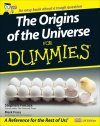![The Origins of the Universe for Dummies The Origins of the Universe for Dummies]()
Click to have a closer look
About this book
Contents
Customer reviews
Biography
Related titles
About this book
Do you want to learn about the physical origin of the Universe, but don't have the rest of eternity to read up on it? Do you want to know what scientists know about where you and your planet came from, but without the science blinding you? 'Course you do and who better than "For Dummies" to tackle the biggest, strangest and most wonderful question there is! "The Origins of the Universe For Dummies" covers: early ideas about our universe; modern cosmology; Big Bang theory; dark matter and gravity; galaxies and solar systems; life on earth; finding life elsewhere; and the Universe's forecast.
Contents
Introduction. Part I: In the Beginning: Early Ideas About Our Universe. Chapter 1: Exploring the Early Universe. Chapter 2: Looking Up at the Stars: Early Beliefs. Chapter 3: The Apple Drops: Newton, Gravity, and the Rotation of the Planets. Part II: Modern Cosmology: Going Off with a Bang. Chapter 4: Bending the Universe: Magnets and Gravity. Chapter 5: Measuring the Universe. Chapter 6: Cooking Up a Big Bang. Chapter 7: Letting It Rise: Expanding and Inflating the Universe. Chapter 8: Thinking Differently About the Universe. Part III: Building Your Own Universe. Chapter 9: Building Things from Scratch. Chapter 10: Forcing the Pace: The Roles of Natural Forces in the Universe. Chapter 11: Shedding Light on Dark Matter and Pinging Strings. Chapter 12: Playing with the Universe's Chemistry Set. Chapter 13: Making Stars, Solar Systems, Galaxies, and More. Chapter 14: Giving Birth to Life. Chapter 15: Travelling Through Time. Part IV: Asking the Tough Questions. Chapter 16: Explaining the Unexplainable. Chapter 17: Finding Life Elsewhere. Chapter 18: Coming to an End. Part V: The Part of Tens. Chapter 19: Ten Different Beliefs about the Origins of the Universe. Chapter 20: Ten Greatest Cosmological Advances. Appendix: Understanding Scientific Units and Equations. Index.
Customer Reviews
Biography
Stephen Pincock has been writing about science for the past 15 years, after finishing a degree in Microbiology at the University of New South Wales, Australia, and realising that while the whole science thing is utterly fascinating, he was less than eager to spend the rest of his life peering down a microscope. Stephen's currently a regular science contributor to The Financial Times and The Lancet among many other publications, and is the international correspondent for The Scientist. For quite a while he was an editor at Reuters Health. Mark Frary is a science and technology writer. He studied astronomy and physics at University College London, writing a dissertation on the production of positronium. While there, he worked at the Mullard Space Science Laboratory on atmospheric plasma physics. After completing his degree, he moved to Geneva and worked on the OPAL experiment at the European particle physics laboratory CERN. Mark co-wrote the book You Call This The Future?, a look at the 50 best sciencefiction gadgets ever conceived and how they have become reality. He lives in Ampthill in Bedfordshire with his wife and two children. Mark and Stephen are the authors of Codebreaker: The History of Secret Communication.














































